Mainz to Guntersblum
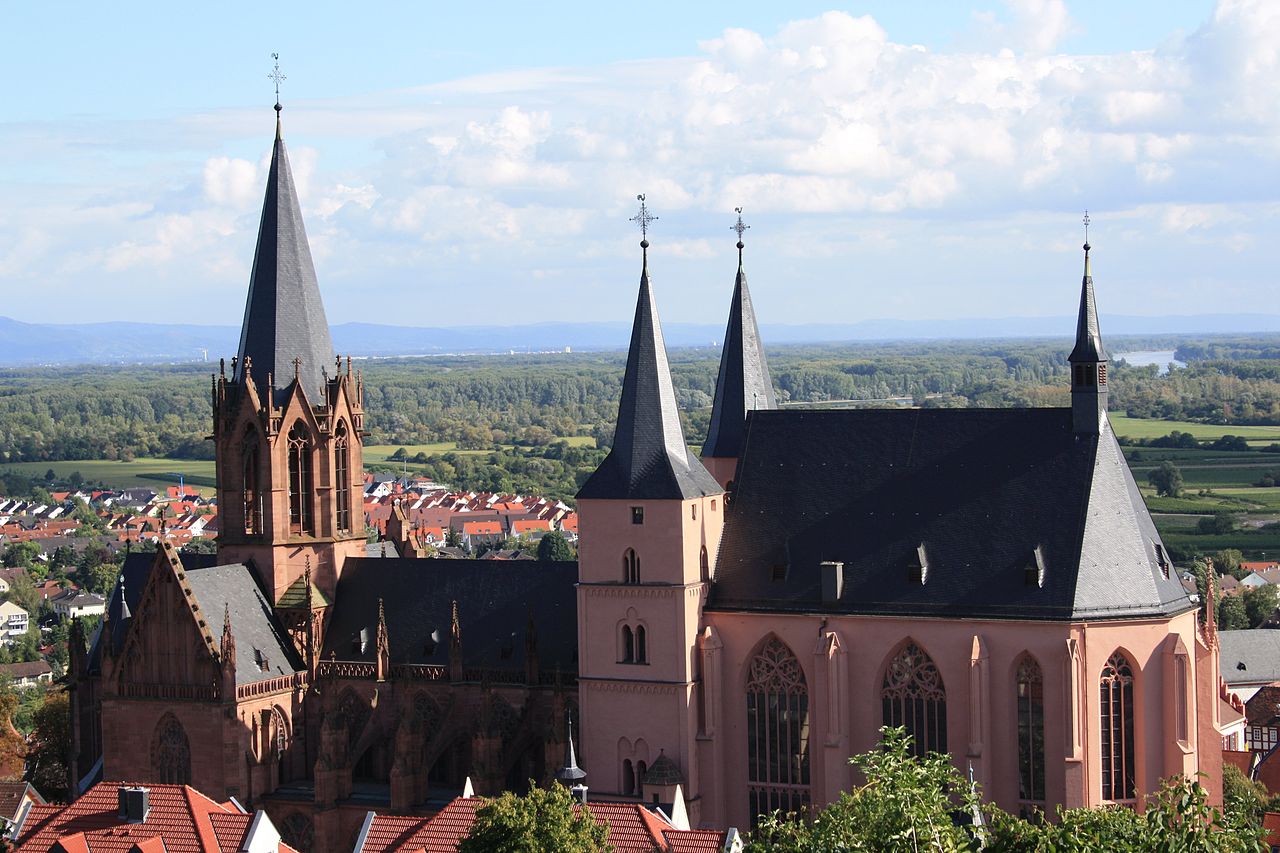
Rheinland-Pfalz
13. Mainz to Guntersblum
Medium
7h
29,5km
+377m
-379m
Step
Embed this item to access it offline
Leave the conurbation and commercial areas of Mainz by following the Rhine banks. Following a national road and railway you reach the vineyards and cross them in a southerly direction before arriving in Guntersblum.
7 points of interest
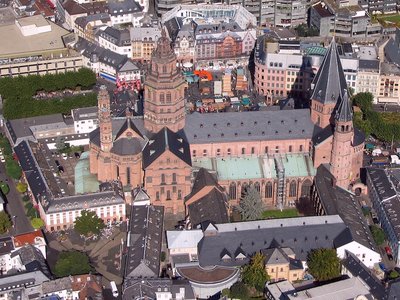
Cathédrale Saint-Martin de Mainz - Wikimedia Commons Wolfgang Pehlemann TouristSt. Martin's Cathedral in Mainz
The base of the cathedral is a "column basilica" of Romanesque architecture with three naves (late 10th century), to which Gothic and Baroque elements were later added (17th and 18th centuries). It celebrated its millennium in 2009.
In the 10th century Willigis, Archbishop of Mainz, decided to build a new cathedral in Ottonian style.
Willigis had a "column basilica" built from the outset, with two choirs, two aisles on either side of the central nave and six towers. It was in the shape of a Latin cross and, because of its size, did not yet have a vault. The subsoil was still marshy due to the proximity of the Rhine, which caused problems with the foundations over the centuries.
The colours of the cathedral at that time remain an important field of research for the curator today.
Archbishop Adalbert I of Saarbrücken (early 12th century) had a two-storey Romanesque chapel erected adjacent to the cathedral, known as the Gotthard Chapel (after Gotthard of Hildesheim), as the princely chapel of the archbishop. As the warheads of this chapel are identical to those of the nave, it is possible that Albert was also the first master builder of the nave replacing Willigis's nave.
More information: Wikipedia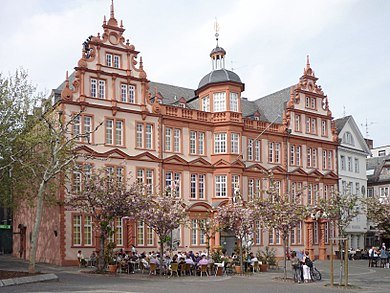
Le musée Gutenberg - Pedelecs CulturalThe Gutenberg Museum Mainz
The Mainz Gutenberg Museum: In the centre of Mainz's Old Town, opposite the Cathedral, you will find one of the oldest book and printing museums in the world. Founded in 1900 by citizens of Mainz, the Gutenberg Museum is dedicated to the "Man of the Millennium" Johannes Gutenberg and his inventions.
Infos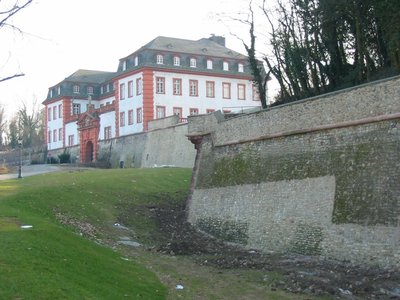
La citadelle de Mayence - Wikimedia Commons Stefan Dumont HistoricalMainz Citadel
The citadel of Mainz in Rhineland-Palatinate - Department of Mont-Tonnerre during the annexation to France - is one of the most beautiful citadels in Germany. In an excellent state of conservation, this tourist site gives the city of Mainz and its historic centre much of its character. The citadel is part of the Federal Fortress of Mainz.
Further information: Wikipedia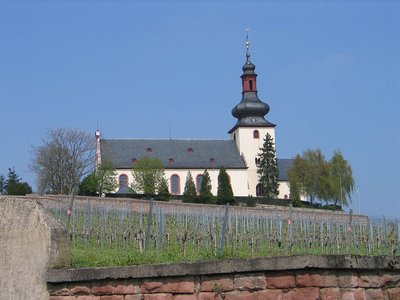
Eglise St Killian Nierstein - wikimedia common Luiger CulturalNierstein is an important wine-growing community on the banks of the Rhine. The church is under the patronage of Saints Kilian, Colman and Totnan, Irish monks who evangelized Franconia between 680 and 689 and died martyrs in Würzburg in 689.
Wikipedia
Chateau de Landskron - Les amis de Saint Colomban HistoricalLandskron Castle in Oppenheim
Landskron Castle (Burg Landskron in German) also known as Reichsburg Oppenheim is a ruined castle located on a hill near the town of Oppenheim, Germany. Its first construction dates back to the 10th century. Its main façade faces south. It allowed the surveillance of the Rhine valley, visible to the south of the castle.
The castle was destroyed in 1118 and again in 1257 by the citizens of the town. It was rebuilt in 1244 and the castle and town were bombed by the French forces of General Mélac during the Augsburg League War in 1689.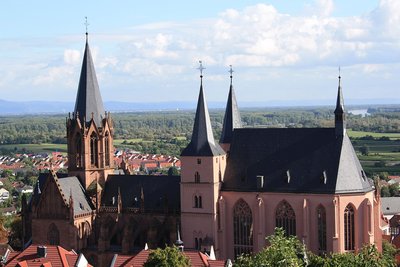
Église Ste Katharina à Opponheim - Les amis de Saint Colomban TouristSt. Catherine's Church in Oppenheim
The Katharinenkirche (Church of St Catherine) in Oppenheim, Germany, is considered an important Gothic building on the Rhine, alongside the cathedrals of Cologne and Strasbourg. Construction probably began in 1225, when Oppenheim was granted city privileges. Since the merger of the Lutheran and Reformed congregation in 1822, it has been a united Protestant church and its congregation is part of the Protestant church of Hesse and Nassau.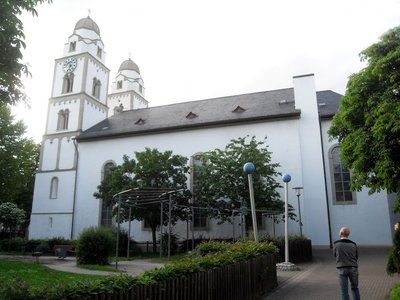
Église évangélique Saint-Victor à Guntersblum - Wikimedia-Commons Jivee Blau CulturalThe churches of St. Victor in Guntersblum
After the introduction of the Reformation in Guntersblum in 1608, the Catholic parish of the village probably held its services in Hangen-Wahlheim or Rudelsheim. The former Catholic church of St. Viktor, dating from 1101, was still used by the Protestant community. In 1617, construction of a new church began on the remains of the old building, which, due to the Thirty Years' War, was probably not completed until 1688. From 1697, the Catholics were granted the right to use the church in common, and a simultaneousousum was held. With the construction of a new Catholic church in Guntersblum, the further history of the Protestant church is considered separately.
From 1842 to 1845, the bourgeois community built a new church for the Catholics in the courtyard of the "Old Castle", which was also consecrated to St. Victor on 16 November 1845. It is a neo-Romanesque building with three high Romanesque windows and a round choir to the east.
More info at: regionalgeschiste.net
Description
From the Cathedral chevet cross Liefraueuplaz, Liefrauenstrasse, Fischtorstrasse, right Rheinstrasse, left Fichtorplatz
- Turn right to follow the Rhine quays, left to take the bridge Drehbrücke am Winterhafen, Victor-Hugo-Ufer
- Leave the bank of the Rhien to follow the railway track before passing under the A 60 motorway, turn right into Dammweg K 13, left into K 14 Rheinstrasse, right at the edge of the Rhein, stay on the cycle and pedestrian path, parallel to B 9
- Turn right at the end of Kisselwörth Island, road junction, cross B 9, take L 431 to cross over the railway, left after the bridge to follow the railway line
- In Nierstein, Killianweg, right Breitgasse, left Abtsgasse, right Rheinstrasse, left small Bahnpfad, Flügelstrasse after the right bend Hinter Sundheim
- Left Bleichweg, Ringstrasse, left Paterweg, right Wörrstädler Starsse, second street on the left Am Hummertal, at the crossroads go straight on slightly to the left into the vineyards, stay on the main path following between the vineyards
- Cross K 44 continue southwards through the vineyards cross K 41, arrival in Guntersblum, left Eimsheimer Strasse
- At the junction of two streets take Kellerweg, turn left into Julianenstrasse and you will arrive in front of the Evangelist Church of St. Victor.
- Departure : Saint Martin's Cathedral, Markt 10, 55116 Mainz
- Arrival : Saint-Victor Church, Kirchstrasse 2, 67583 Guntersblum
- Towns crossed : Rheinland-Pfalz
Altimetric profile
Report a problem or an error
If you have found an error on this page or if you have noticed any problems during your hike, please report them to us here:
Close by7
- Accommodation







